Jim Picerno is a veteran financial journalist and has been writing about portfolio strategies, investment products, and macroeconomics since the early 1990s at Bloomberg and Dow Jones. Picerno is the author of Dynamic Asset Allocation: Modern Portfolio Theory Updated for the Smart Investor (Bloomberg Press, 2010). His articles on finance and economics have appeared in a variety of publications and news outlets, including The Atlantic, Financial Advisor, and BankRate.com. He blogs at CapitalSpectator.com
~~~
Best of Book Bits 2011
The year behind us delivered one of the better runs in publishing for finance and economic books. What follows are some of the more memorable names from my weekly Book Bits column over the past 12 months. Next week I’ll follow up with Part II. Meanwhile, here’s the first installment of a somewhat arbitrary listing of worthy titles from 2011:
● Expected Returns: An Investor’s Guide to Harvesting Market Rewards
By Antti Ilmanen
Excerpt via publisher, Wiley
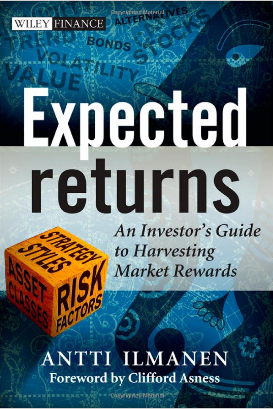 We should humbly recognize the limits of our understanding. Realized returns are dominated by randomness, structural uncertainty, and rare events. Expected returns are unobservable, at best estimated with noise. We should resist hindsight biases wired in us—the outcomes that materialized seem more inevitable or predictable than they truly were. It is worth recalling that experts can only explain a fraction of realized return variation afterwards, and this is an inherently easier task than predicting. Any observed return predictability is mild, possibly spurious, and rarely robust. Therefore I stress humility in interpreting empirical results and even more in making predictions and in trading based on them.
We should humbly recognize the limits of our understanding. Realized returns are dominated by randomness, structural uncertainty, and rare events. Expected returns are unobservable, at best estimated with noise. We should resist hindsight biases wired in us—the outcomes that materialized seem more inevitable or predictable than they truly were. It is worth recalling that experts can only explain a fraction of realized return variation afterwards, and this is an inherently easier task than predicting. Any observed return predictability is mild, possibly spurious, and rarely robust. Therefore I stress humility in interpreting empirical results and even more in making predictions and in trading based on them.
● The Quest: Energy, Security, and the Remaking of the Modern World
By Daniel Yergin
Review via The Economist
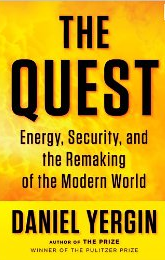 Providing sufficient energy to seven billion increasingly affluent humans without burning up the planet may be humanity’s greatest challenge. “What is at stake”, writes Daniel Yergin, “is the future itself.”
Providing sufficient energy to seven billion increasingly affluent humans without burning up the planet may be humanity’s greatest challenge. “What is at stake”, writes Daniel Yergin, “is the future itself.”
Mr Yergin’s previous book, “The Prize”![]() , a history of the global oil industry, had the advantage of an epic tale and wondrous timing. Years in the making, it was published, to critical and popular acclaim in 1990, two months after Saddam Hussein invaded Kuwait, thereby putting Saudi Arabia’s oilfields in peril. “The Quest”, as its more open-ended title suggests, is a broader and more ambitious endeavour. It is, first, an account of the many ways in which people have sought to produce energy—by burning fossil fuels, harvesting the wind, brewing biodiesel and trapping the sun’s heat. It is also an analysis of the increasingly fraught political context in which this business is conducted, especially with regard to three big and longstanding fears: energy scarcity, energy security and, more and more, the environmental ruin that energy can cause.
, a history of the global oil industry, had the advantage of an epic tale and wondrous timing. Years in the making, it was published, to critical and popular acclaim in 1990, two months after Saddam Hussein invaded Kuwait, thereby putting Saudi Arabia’s oilfields in peril. “The Quest”, as its more open-ended title suggests, is a broader and more ambitious endeavour. It is, first, an account of the many ways in which people have sought to produce energy—by burning fossil fuels, harvesting the wind, brewing biodiesel and trapping the sun’s heat. It is also an analysis of the increasingly fraught political context in which this business is conducted, especially with regard to three big and longstanding fears: energy scarcity, energy security and, more and more, the environmental ruin that energy can cause.
● Red-Blooded Risk: The Secret History of Wall Street
By Aaron Brown
Summary via publisher, Wiley
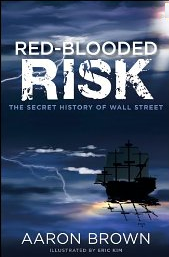 From 1987 to 1992, a small group of Wall Street quants invented an entirely new way of managing risk to maximize success: risk management for risk-takers. This is the secret that lets tiny quantitative edges create hedge fund billionaires, and defines the powerful modern global derivatives economy. The same practical techniques are still used today by risk-takers in finance as well as many other fields. Red-Blooded Risk examines this approach and offers valuable advice for the calculated risk-takers who need precise quantitative guidance that will help separate them from the rest of the pack. While most commentators say that the last financial crisis proved it’s time to follow risk-minimizing techniques, they’re wrong. The only way to succeed at anything is to manage true risk, which includes the chance of loss. Red-Blooded Risk presents specific, actionable strategies that will allow you to be a practical risk-taker in even the most dynamic markets.
From 1987 to 1992, a small group of Wall Street quants invented an entirely new way of managing risk to maximize success: risk management for risk-takers. This is the secret that lets tiny quantitative edges create hedge fund billionaires, and defines the powerful modern global derivatives economy. The same practical techniques are still used today by risk-takers in finance as well as many other fields. Red-Blooded Risk examines this approach and offers valuable advice for the calculated risk-takers who need precise quantitative guidance that will help separate them from the rest of the pack. While most commentators say that the last financial crisis proved it’s time to follow risk-minimizing techniques, they’re wrong. The only way to succeed at anything is to manage true risk, which includes the chance of loss. Red-Blooded Risk presents specific, actionable strategies that will allow you to be a practical risk-taker in even the most dynamic markets.
● Retirement Heist: How Companies Plunder and Profit from the Nest Eggs of American Workers
By Ellen E. Schultz
Review via Publishers Weekly
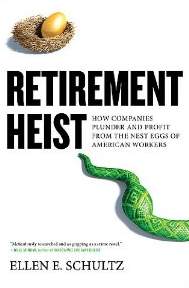 The retirement crisis is no accident, claims Wall Street Journal investigative reporter Schultz; large companies have played a significant role in its creation to protect the wealth of its top executives. When GE, IBM, Verizon, and others slashed pensions and medical benefits for millions of American retirees, they pointed fingers everywhere but at themselves–but who was really at fault? Pension funds were not bleeding the companies of cash. GE hadn’t contributed a cent to the workers’ pension plans since 1987, but still had enough money to cover all current and future retirees. Executive pensions at GE, with a $6 billion obligation, are a drag on earnings. These are largely hidden, however, lumped in with the figures for regular pensions. Schultz’s methodical cataloguing of these abuses paints a highly unflattering picture of companies that cut benefits to boost earnings, lay off older workers who are entering the years in which their pensions will spike, inflate retiree health benefits to boost profits, lobby for laws that keep the system inequitable, hoard death benefits, and fire whistle-blowers.
The retirement crisis is no accident, claims Wall Street Journal investigative reporter Schultz; large companies have played a significant role in its creation to protect the wealth of its top executives. When GE, IBM, Verizon, and others slashed pensions and medical benefits for millions of American retirees, they pointed fingers everywhere but at themselves–but who was really at fault? Pension funds were not bleeding the companies of cash. GE hadn’t contributed a cent to the workers’ pension plans since 1987, but still had enough money to cover all current and future retirees. Executive pensions at GE, with a $6 billion obligation, are a drag on earnings. These are largely hidden, however, lumped in with the figures for regular pensions. Schultz’s methodical cataloguing of these abuses paints a highly unflattering picture of companies that cut benefits to boost earnings, lay off older workers who are entering the years in which their pensions will spike, inflate retiree health benefits to boost profits, lobby for laws that keep the system inequitable, hoard death benefits, and fire whistle-blowers.
● Thinking, Fast and Slow
By Daniel Kahneman
Excerpt via The New York Times
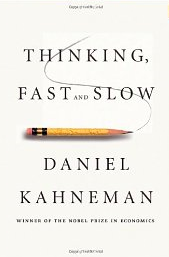 Although professionals are able to extract a considerable amount of wealth from amateurs, few stock pickers, if any, have the skill needed to beat the market consistently, year after year. The diagnostic for the existence of any skill is the consistency of individual differences in achievement. The logic is simple: if individual differences in any one year are due entirely to luck, the ranking of investors and funds will vary erratically and the year-to-year correlation will be zero. Where there is skill, however, the rankings will be more stable. The persistence of individual differences is the measure by which we confirm the existence of skill among golfers, orthodontists or speedy toll collectors on the turnpike.
Although professionals are able to extract a considerable amount of wealth from amateurs, few stock pickers, if any, have the skill needed to beat the market consistently, year after year. The diagnostic for the existence of any skill is the consistency of individual differences in achievement. The logic is simple: if individual differences in any one year are due entirely to luck, the ranking of investors and funds will vary erratically and the year-to-year correlation will be zero. Where there is skill, however, the rankings will be more stable. The persistence of individual differences is the measure by which we confirm the existence of skill among golfers, orthodontists or speedy toll collectors on the turnpike.
Here’s the second installment of my bids for the best economic and finance books for 2011 (you can find Part I here). Yes, it’s subjective and there are other worthy titles that go unmentioned. Space may be unlimited on the web, but time is still finite. On that note, here’s one that got away: Pandora’s Risk: Uncertainty at the Core of Finance![]() , by Kent Osband. This one should have been tapped for Book Bits when it was published this past summer. Better late than never. In any case, Osband takes the market bull by the horns and brings us on an enlightening quantitative journey through the crucial business of thinking about and managing risk in the money game. An instant classic that’s at once provocative, thought-provoking, and practical (pay special attention to his innovative take on measuring price volatility in chapter 11). Meanwhile, here are some of the more memorable names that actually made it to these digital pages during the past 12 months of Book Bits:
, by Kent Osband. This one should have been tapped for Book Bits when it was published this past summer. Better late than never. In any case, Osband takes the market bull by the horns and brings us on an enlightening quantitative journey through the crucial business of thinking about and managing risk in the money game. An instant classic that’s at once provocative, thought-provoking, and practical (pay special attention to his innovative take on measuring price volatility in chapter 11). Meanwhile, here are some of the more memorable names that actually made it to these digital pages during the past 12 months of Book Bits:
● Models.Behaving.Badly: Why Confusing Illusion with Reality Can Lead to Disaster, on Wall Street and in Life
By Emanuel Derman
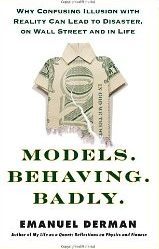 Review via Bloomberg
Review via Bloomberg
Disturbed, disillusioned and ashamed: Those aren’t emotions you expect a Wall Street quant to express when asked why taxpayers were obliged to bail out wealthy bankers. Unless, of course, the quant is Emanuel Derman, a particle physicist and former head of quantitative finance at Goldman Sachs Group Inc. “I am ashamed at the hypocrisies of the system,” Derman writes in “Models.Behaving.Badly,” an erudite yet pleasantly readable exploration of why financial models failed during the U.S. mortgage meltdown and why modelers must learn to use them more wisely. “We were told not to expect reward without risk, gain without the possibility of loss,” he says in disgust. “Now we have been forced to accept crony capitalism, private profits and socialized losses, and corporate welfare.” Unlike many quants, Derman says he wasn’t surprised that models failed in 2007, as events predicted to happen “once in 10,000 years happened every day for three days,” as one strategist at Lehman Brothers Holdings Inc. put it. The breakdown, Derman argues, flows from a misunderstanding of the difference between models and theories.
● The Era of Uncertainty: Global Investment Strategies for Inflation, Deflation, and the Middle Ground
By Francois Trahan and Katherine Krantz
Summary via publisher, Wiley
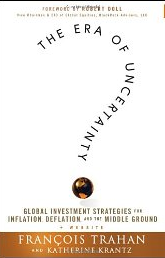 The recent credit crisis in the United States ushered in a new era of uncertainty. Like other bubbles, it was born out of an extended period of easy money that fueled prosperity and engendered speculation, but it was not the same as a euphoric run up and crash of technology stocks; it was an assault on two pillars holding up middle-class America: homes and credit. The remaining two pillars—employment income and investments—were collateral damage. People can no longer count on ample access to credit, increasing home values, and abundant job opportunities to propel them into a better lifestyle. In The Era of Uncertainty: Global Investment Strategies for Inflation, Deflation, and the Middle Ground, François Trahan, Vice Chairman and Chief Investment Strategist of Wolfe Trahan & Co, and Katherine Krantz, Managing Director and Founding Partner of Miracle Mile Advisors, LLC, present a new framework for investing in a dynamic, macro-driven world. The book addresses the creation and aftermath of bubbles from a top-down perspective and shows how applying the macro framework can help investors profit from the interwoven inflationary and deflationary scenarios likely to evolve in the next several years. It also examines the role of macro analysis in the markets: how top-down forces influence the direction of financial markets; how including macro analysis in research improves the odds of investment profits; and the potential pitfalls of ignoring macro trends in the investment process.
The recent credit crisis in the United States ushered in a new era of uncertainty. Like other bubbles, it was born out of an extended period of easy money that fueled prosperity and engendered speculation, but it was not the same as a euphoric run up and crash of technology stocks; it was an assault on two pillars holding up middle-class America: homes and credit. The remaining two pillars—employment income and investments—were collateral damage. People can no longer count on ample access to credit, increasing home values, and abundant job opportunities to propel them into a better lifestyle. In The Era of Uncertainty: Global Investment Strategies for Inflation, Deflation, and the Middle Ground, François Trahan, Vice Chairman and Chief Investment Strategist of Wolfe Trahan & Co, and Katherine Krantz, Managing Director and Founding Partner of Miracle Mile Advisors, LLC, present a new framework for investing in a dynamic, macro-driven world. The book addresses the creation and aftermath of bubbles from a top-down perspective and shows how applying the macro framework can help investors profit from the interwoven inflationary and deflationary scenarios likely to evolve in the next several years. It also examines the role of macro analysis in the markets: how top-down forces influence the direction of financial markets; how including macro analysis in research improves the odds of investment profits; and the potential pitfalls of ignoring macro trends in the investment process.
● Exorbitant Privilege: The Rise and Fall of the Dollar and the Future of the International Monetary System
By Barry Eichengreen
Summary via publisher, Oxford University Press
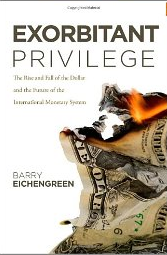 For more than half a century, the U.S. dollar has been not just America’s currency but the world’s. It is used globally by importers, exporters, investors, governments and central banks alike… This dependence on dollars, by banks, corporations and governments around the world, is a source of strength for the United States. It is, as a critic of U.S. policies once put it, America’s “exorbitant privilege.” However, recent events have raised concerns that this soon may be a privilege lost. Among these have been the effects of the financial crisis and the Great Recession: high unemployment, record federal deficits, and financial distress. In addition there is the rise of challengers like the euro and China’s renminbi. Some say that the dollar may soon cease to be the world’s standard currency–which would depress American living standards and weaken the country’s international influence.
For more than half a century, the U.S. dollar has been not just America’s currency but the world’s. It is used globally by importers, exporters, investors, governments and central banks alike… This dependence on dollars, by banks, corporations and governments around the world, is a source of strength for the United States. It is, as a critic of U.S. policies once put it, America’s “exorbitant privilege.” However, recent events have raised concerns that this soon may be a privilege lost. Among these have been the effects of the financial crisis and the Great Recession: high unemployment, record federal deficits, and financial distress. In addition there is the rise of challengers like the euro and China’s renminbi. Some say that the dollar may soon cease to be the world’s standard currency–which would depress American living standards and weaken the country’s international influence.
In Exorbitant Privilege, one of our foremost economists, Barry Eichengreen, traces the rise of the dollar to international prominence over the course of the 20th century. He shows how the greenback dominated internationally in the second half of the century for the same reasons–and in the same way–that the United States dominated the global economy. But now, with the rise of China, India, Brazil and other emerging economies, America no longer towers over the global economy. It follows, Eichengreen argues, that the dollar will not be as dominant. But this does not mean that the coming changes will necessarily be sudden and dire–or that the dollar is doomed to lose its international status.
● Economics Evolving: A History of Economic Thought
By Agnar Sandmo
Review via The Enlightened Economist
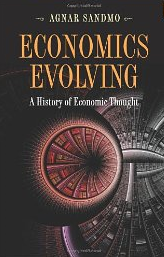 I’ve just finished reading Economics Evolving: A history of economic thought by Agnar Sandmo, and commend it to every economist and student of economics. It’s a clear and fair account of the contribution to the subject by the key figures in its intellectual history, with a focus on Adam Smith and his immediate predecessors to the 1970s. The book would make an ideal text for a history of thought module in a degree course, but is also an accessible general read for an economist seeking some perspective on the state of economics today. I particularly appreciated not being able to tell the author’s own opinions; the book simply gives a straightforward account of both sides of the various controversies… Anyway, Economics Evolving is a highly commended book, which completely defied my initial impression that it was going to be worthy but dull. Heilbronner’s The Worldly Philosophers
I’ve just finished reading Economics Evolving: A history of economic thought by Agnar Sandmo, and commend it to every economist and student of economics. It’s a clear and fair account of the contribution to the subject by the key figures in its intellectual history, with a focus on Adam Smith and his immediate predecessors to the 1970s. The book would make an ideal text for a history of thought module in a degree course, but is also an accessible general read for an economist seeking some perspective on the state of economics today. I particularly appreciated not being able to tell the author’s own opinions; the book simply gives a straightforward account of both sides of the various controversies… Anyway, Economics Evolving is a highly commended book, which completely defied my initial impression that it was going to be worthy but dull. Heilbronner’s The Worldly Philosophers![]() is still a terrific introductory read but is nothing like as substantial as this book, which is the best overview I’ve come across of the history of thought in economics.
is still a terrific introductory read but is nothing like as substantial as this book, which is the best overview I’ve come across of the history of thought in economics.
● The Coming Jobs War
By Jim Clifton
Review via MoneyWeb
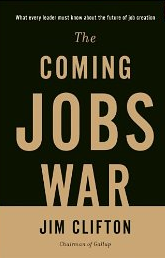 Clifton asserts that job creation will surpass all other issues to dominate politics. He likens the challenges to the second world war while further asserting that the war has already begun… It seems likely that “job creation” is destined to become the leader among business publication categories adding to the pressure on politicians everywhere. Few companies have Gallup’s experience in discerning data. The book points out that the world has 7 billion people with 5 billion being of working age. Of those, 3 billion desire full-time formal employment while globally there are only 1.2 billion jobs that meet his criteria, “pay check from an employer and steady work that averages 30-plus hours per week”.
Clifton asserts that job creation will surpass all other issues to dominate politics. He likens the challenges to the second world war while further asserting that the war has already begun… It seems likely that “job creation” is destined to become the leader among business publication categories adding to the pressure on politicians everywhere. Few companies have Gallup’s experience in discerning data. The book points out that the world has 7 billion people with 5 billion being of working age. Of those, 3 billion desire full-time formal employment while globally there are only 1.2 billion jobs that meet his criteria, “pay check from an employer and steady work that averages 30-plus hours per week”.

